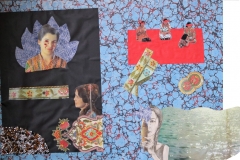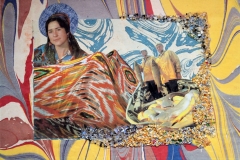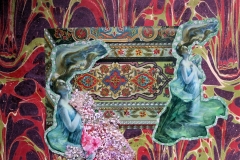Mohira Suyarkulova, Nazik Abylgazieva, Zulya Esentaeva, , Oksana Kapishnikova, Altyn Kapalova, Aidai Maksatbekova, Lia Sozashvili, Olcha Shchetinina
Collages

In Khujand Mohira Suyarkulova noticed that on the city beach as well as the ‘wild’ beach of the Kairakkum reservoir (now proudly called the ‘Tajik Sea’), in teahouses and speakeasies on the river bank, among the backgammon players, fishers and swimmers, women’s presence is rare and unusual. The water’s edge is a place where the existing gendered norms of propriety and sexuality are at risk and need to be enforced.


Mohira was amazed to see that men are not at all embarrassed to stroll along the beach and swim in their underwear, while women remained fully dressed. Women could not swim. Mohira felt too awkward to undress, so she decided to also try swimming fully clothed. The garments soaked up water, clung to her body and weighed her down, restricting the movement. No wonder local girls and women rarely learn how to swim!


Historically in/ability to swim reflected the existing structures of inequality – women often do not have access to the same resources and skills as men, including the resources and skills linked to the rivers and other bodies of water. At times, this denial of access to the river and inability to swim may cost women lives.


In Khujand women also often only gain access to water as drowning victims and suicides. In Sughd province women’s suicide rate is almost double that of men. The main cause – gender-based violence. This series of collages was created by the collective called “Water witches” based on these observations of the researcher.





